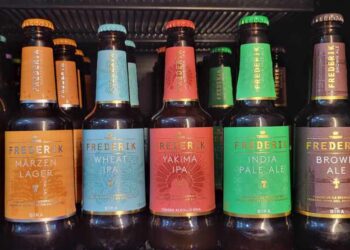Rapid rises in operational costs are damaging hospitality’s capital expenditure (capex) programmes, the latest Business Confidence Survey from CGA by NIQ and Sona reveals.

The survey of industry leaders shows that nearly two-thirds (63%) have increased their operational expenditure over the last 12 months, following inflationary pressures on the costs of labour, food and drink, and other key inputs. However, only a third (34%) have increased their capital expenditure. Close to half (45%) have been forced to cut their capex — more than double the 20% who have reduced their operational expenditure.
The survey highlights a growing split in hospitality, with 25% of leaders currently able to increase both their operational and capital expenditure, but 14% forced to reduce both. This indicates the current fragility of the sector, with 9% of leaders reporting that they now have no cash reserves to draw on, while 53% have fewer than six months of reserves.
Soaring costs have been particularly damaging for smaller operators, the survey shows. Just 22% of independents have increased their capital expenditure year on year, while 60% have been forced to cut it — 15 percentage points more than the sector average.
Intense cost pressures are forcing businesses to make difficult decisions on investment, but leaders recognise the value of capex in sustaining sales and keeping pace with competitors. Two-thirds (65%) of leaders say site refurbishments are a high or medium priority for investment, while 55% say the same about workforce management technology. Half (50%) identify both customer-facing technology and site acquisitions as high or medium priorities.
Despite low optimism at the moment, the Business Confidence Survey provides some cause for cautious confidence about the outlook. While three in five (61%) leaders say the economic environment is currently a barrier to their capital expenditure, only 27% cite consumer sentiment — an indication that Britain’s underlying demand for hospitality remains strong.
• Like-for-like sales at Marston’s pubs rose 1.6% in the 52 weeks to 27th September, the company has announced.
Underlying profit before tax is expected to be ahead of market expectations, marking a second consecutive year of significant profit growth following the 65% uplift delivered in 2024.
An accelerated capital expenditure programme is in place for 2026 to build on the company’s strong momentum, with a significant step-up in format refurbishments over the next 12 months.
“We have delivered another year of strong profit growth and significantly improved recurring free cashflow, providing us with continued opportunity to invest in our estate, reduce debt, and unlock long-term value for shareholders,” said chief executive Justin Platt.
“Our market-leading pub operating model has been central to delivering strong margin uplifts, while guest experience scores have reached record levels – a testament to the passion and dedication of our teams.

“Our differentiated pub formats are already delivering impressive results, with a defined plan to accelerate this further in 2026.”
He added: “With clear strategic priorities and disciplined execution, we enter the new year with strong momentum. Our results demonstrate we are delivering as a high-margin hospitality business, and with our formats growth engine showing great promise, we are poised to drive further financial and strategic progress.”
• Valiant Pub Group grew its estate to 80 pubs across the UK in the financial year to 30th March, increasing total revenue by 63% to £29.6 million, up from £18.2m in 2024.
Group revenue increased by 63% year on year, with like-for-like sales across mature sites increasing 2.7%. Pub EBITDA increased to £5.5m (FY24: £2.m), underpinned by disciplined cost control and strategic pricing. Adjusted group EBITDA (post group overhead) turned positive at £0.8m.
In 2024, Valiant introduced a new group structure to streamline operations, secure debt financing, and support its long-term growth objectives. The business remains well-capitalised and is actively pursuing further acquisitions to extend its reach into more UK communities.
With solid financial backing from strategic partner Njord Partners, and increasing support from Metro Bank, Valiant says it is well-positioned for its next phase of expansion. The group’s acquisition pipeline remains strong, with new pub investments planned for the year ahead.
“We are proud of the progress made this year — from expanding our footprint to improving profitability and securing new funding,” said chief executive Mark McGinty.
“Our flexible operating model, strong partnerships, and deep community focus have positioned us well for continued growth.”
Arvid Trolle, co-founder of Njord Partners, added:“We are pleased with Valiant’s strong results this year, which clearly demonstrate that our commitment to revitalising community pubs is delivering real success.
“Building on this momentum, I am confident that the entire Valiant team will continue to achieve great performance and make a meaningful difference in the communities we serve.”







